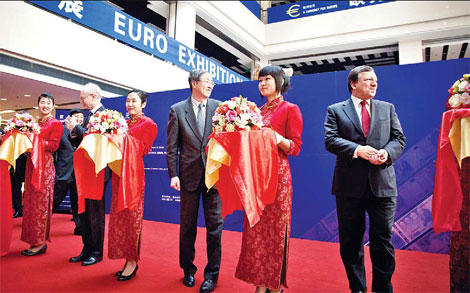Investment 'will continue'
Updated: 2012-02-16 07:57
By Zheng Yangpeng (China Daily)
|
|||||||||
|
Zhou Xiaochuan, central bank governor, European Council President Herman Van Rompuy and European Commission President Jose Manuel Barroso (right) attend the opening ceremony for Euro Exhibition, which was held at the Beijing-based University of International Business and Economics on Wednesday. Cao Huan / China Daily |
Central bank chief urges Europe to offer China more attractive products
BEIJING - China will continue to invest in eurozone sovereign debt, China's central bank governor Zhou Xiaochuan said on Wednesday.
"We look for the eurozone and EU to ... offer investment products that are more attractive and favorable for China-EU cooperation," Zhou said.
He made the comments while hosting an event for visiting European Council President Herman Van Rompuy and European Commission President Jose Manuel Barroso.
Zhou's remarks, which followed an earlier comment by Premier Wen Jiabao, were taken as indications of an increasingly positive attitude among Chinese leaders toward buying euro debt at an appropriate time.
On Tuesday, Wen told Van Rompuy and Barroso that China would continue to invest in euro debt in line with the principles of security, liquidity and value preservation.
He also said that China would increase its participation through the International Monetary Fund, the European Financial Stability Facility and the future European Stability Mechanism.
"At the G20 meeting, our state leaders promised European leaders that, amid the global financial crisis and the European sovereign debt crisis, China will not reduce the proportion of euro exposure in its reserves," Zhou said.
Zhou's remark helped push the euro to an intraday high of $1.3163.
The eurozone put approval of a new bailout on hold late on Tuesday as Greece was still working to come up with an extra 325 million euros ($425 million) in budget cuts, Reuters reported.
Eurozone leaders also demanded written pledges from Greek politicians, who face a likely snap vote in April, that all austerity measures promised to EU and IMF creditors will be implemented regardless of the outcome of the election, Reuters reported.
China, with $3.2 trillion in foreign exchange reserves, is seen as having the potential to bail out some troubled European governments.
"In the short term, the US economy has performed much better than that of the eurozone, and there is no reason to decrease US debt holdings.
"That is why China has taken a wait-and-see attitude on bailing out the eurozone," Yu Miaojie, associate professor at the China Center for Economic Research of Peking University, told China Daily.
He estimated that a large-scale investment, if any, would be made in the second half. The preferred option would be capital injections into the IMF and ESM.
The latter is a 500-billion-euro permanent bailout fund that is due to be operational in July. It is expected to replace the EFSF, a temporary fund.
But Chen Fengying, director of the Institute of World Economic Studies at the China Institutes of Contemporary International Relations, argued that the time was ripe for China to help Europe.
Chen said that the IMF had clearly signaled an increase in its fund aiming to bail out Europe.
"China can help Europe with many choices, including bilateral and multilateral cooperation, direct investments and buying sovereign bonds," said Chen.
Van Rompuy assured his Chinese hosts that they should not underestimate the strong political incentive to keep the eurozone intact.
"In the current crisis, beyond the money involved, it is a common European destiny which is at stake. That is why we will do everything that is required to maintain the euro and the financial stability of the eurozone," Rompuy said in his speech.
Barroso noted that the European Central Bank was taking decisive action by making liquidity available to banks.
"The European Central Bank alleviated capital pressure on banks and the sovereign bond market, and stabilized the economic situation of the eurozone with massive liquidity injections into the banking system in December through the Long-Term Refinancing Operation," according to Wang Tao, head of China economic research at UBS Securities Co Ltd.
She said the ECB would continue its easing policy to shore up the region's economy.
On Jan 30, a fiscal pact was agreed to by 25 of the 27 EU states, which would set stricter deficit limits.
The treaty is scheduled to be formally signed in March.
Wang Xiaotian, Li Jiabao and Gui Yi contributed to this story.
China Daily
(China Daily 02/16/2012 page13)

 Relief reaches isolated village
Relief reaches isolated village
 Rainfall poses new threats to quake-hit region
Rainfall poses new threats to quake-hit region
 Funerals begin for Boston bombing victims
Funerals begin for Boston bombing victims
 Quake takeaway from China's Air Force
Quake takeaway from China's Air Force
 Obama celebrates young inventors at science fair
Obama celebrates young inventors at science fair
 Earth Day marked around the world
Earth Day marked around the world
 Volunteer team helping students find sense of normalcy
Volunteer team helping students find sense of normalcy
 Ethnic groups quick to join rescue efforts
Ethnic groups quick to join rescue efforts
Most Viewed
Editor's Picks

|

|

|

|

|

|
Today's Top News
Health new priority for quake zone
Xi meets US top military officer
Japan's boats driven out of Diaoyu
China mulls online shopping legislation
Bird flu death toll rises to 22
Putin appoints new ambassador to China
Japanese ships blocked from Diaoyu Islands
Inspired by Guan, more Chinese pick up golf
US Weekly

|

|








